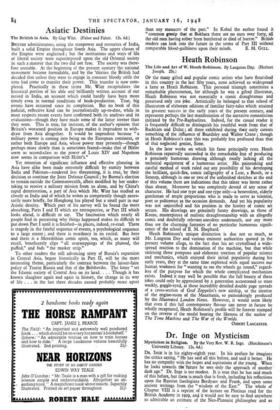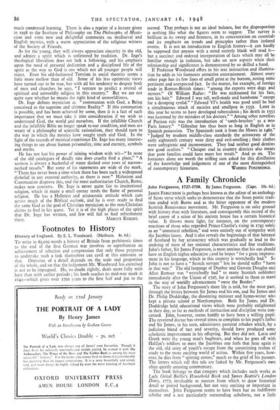Dr. Inge on Mysticism
DR. INGE is in his eighty-eighth year. In his preface he imagines the critics saying, " He has said all this before, and said it better. He has no sympathy with the hopes and aspirations of the young. When he looks towards tibaluttue he sees only the approach of another dark age." Dr. Inge is too modest. It is true that he has said much of this before, but there is.much that is fresh, including his reflections upon the Russian theologians Berdyaev and Frank, and upon some ancient writings from the "wisdom of the East." The whole of Chapter VIII is a reprint of the lecture on Plotinus read for the British Academy in 1929, and it would not be easy to find anywhere so admirable an estimate of the Neo-Platonist philosopher and so
much condensed learning. There is also a reprint of a lecture given in 1938 to the Institute of Philosophy on The Philosophy of Mysti- cism and some new and delightful comments on mediaeval and English mystics, with a warm appreciation of the religious witness of the Society of Friends.
As for the young, they will always appreciate sincerity in the old, and admire a spirit which is unfettered by tradition. Dr. Inge's theological liberalism does not lack a following, and his emphasis upon the need of personal dedication and a disciplined life of the spirit as the way to God is one which not all younger people will reject. Even his old-fashioned Toryism in social theories seems a little more mellow than of old. Some of his less optimistic views have turned out to be true, but with all his tendency to despair both of men and churches he says, " I venture to predict a revival of spiritual and unworldly religion in this country." But we are not quite sure whether he means the right kind of unworldliness.
Dr. Inge defines mysticism as "communion with God, a Being conceived as the supreme and ultimate Reality." If this communion is possible, and has been achieved by some, then it is a fact of such importance that we must take it into consideration if we wish to understand God, the world and ourselves. If the infallible Church and the infallible Bible no longer speak to our condition, and men are weary of a philosophy of scientific rationalism, they should turn to the way in which the mystics have sought truth and God. In the light of the records of mystical experience Dr. Inge has many interest- ing things to say about human personality, time and eternity, symbols and myths.
He has not lost his power of mixing wisdom with wit—" In none of the old catalogues of deadly sins does cruelty find a place," " A sermon is always a bucketful of water dashed over rows of narrow- necked vessels." But some of his statements are wide of the mark. " There has never been a time when there has been such a widespread disbelief in any external authority, as there is now." Hitlerism and Communism disprove this, and the most authoritarian Church, Rome, makes new converts. Dr. Inge is never quite fair to institutional religion, which in many a small corner tends the flame of personal religion. He has a Hellenist and aristocratic attitude which cuts across much of the Biblical outlook, and he is over ready to find the same God as the goal of Christian mysticism as the non-Christian claims to find in his quest. Yet it is of the high places of the spirit that Dr. Inge has written, and few will fail to find refreshment



































 Previous page
Previous page